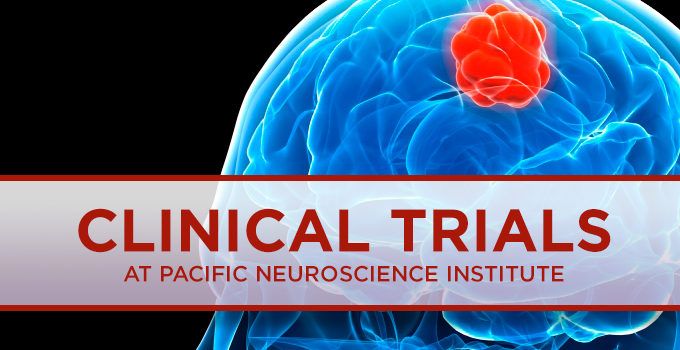

Clinical Trials Round-Up: March 2017
by Najee Boucher
Find out about our roster of clinical trials at the Pacific Neuroscience Research Center at Pacific Neuroscience Institute.
TRIALS OPEN FOR ENROLLMENT:
New Trial
Medicenna Therapeutics, Inc. (PDF): An Open-Label Non-Randomized, Multi-Center Phase-2 Study of Convection-Enhanced Delivery (CED) of MDNA55 in Adults With Glioblastoma at First Recurrence or Progression (NCT02858895)
We are excited to announce our participation in a clinical trial of MDNA55 in adults with recurrent Glioblastoma where MDNA55 is administered directly into the brain tumor by a single infusion. MDNA55 is a targeted therapy, designed to attack only tumor cells, leaving healthy tissue unaffected. It may also help the immune system to recognize and attack the tumor. The study aims to assess the risks and possible benefits of MDNA55 treatment.
The trial is led by principal investigator, Achal Singh Achrol, MD. Dr. Achrol is the Director of Neurovascular Surgery and Neurocritical Care at the Pacific Neuroscience Institute and Chief of the Glioma Surgery Program at the Saint John’s Cancer Institute at Providence Saint John’s Health Center.
Interestingly, Saint John’s Cancer Institute was home to the very first clinical study of MDNA55 in 1997 under the leadership of the late Dr. Robert Rand. This first clinical study of MDNA55 aimed to evaluate safety and anti-tumor activity of different doses injected directly into the tumors of 9 subjects with recurrent Glioblastoma. Promising results from this initial trial led in 1999 to the technology being licensed for continued clinical development. To date a total of 72 adults have received intratumoral administration of MDNA55.
ONGOING TRIALS
Primary Brain Tumor
AbbVie / RTOG (PDF): A Study of ABT-414 in Subjects With Newly Diagnosed Glioblastoma (GBM) With Epidermal Growth Factor Receptor (EGFR) Amplification (NCT02573324)
Boehringer Ingelheim (PDF): A Phase I Dose Escalation and CNS Pharmacokinetic Study of the ErbB Family Inhibitor Afatinib in Patients with Recurrent or Progressive Brain Cancer (NCT02423525)
ImmunoCellular (PDF): A Phase III Randomized Double-Blind, Controlled Study of ICT-107 withMaintenance Temozolomide (TMZ) in Newly Diagnosed Glioblastoma following Resection andConcomitant TMZ Chemoradiotherapy (NCT02546102)
Nativis (PDF): A Feasibility Study of the Nativis Voyager System in Patients With Recurrent Glioblastoma Multiforme (GBM) (NCT02296580)
Orbus Therapeutics (PDF): A Randomized Phase 3 Open-Label Study To Evaluate the Efficacy and Safety of Eflornithine With Lomustine Compared to Lomustine Alone in Patients With Anaplastic AstrocytomaThat Progress/Recur After Irradiation and Adjuvant Temozolomide Chemotherapy (NCT02796261)
Triphase MRZ-108 (PDF): Phase 2 Trial of Single Agent Marizomib in Progressive or Recurrent Grade IV Malignant Glioma (NCT02330562)
Triphase MRZ-112 (PDF): Study of Marizomib With Temozolomide and Radiotherapy in Patients WithNewly Diagnosed Brain Cancer (NCT02903069)
Brain Metastases
Boehringer Ingelheim (PDF): A Phase I Dose Escalation and CNS Pharmacokinetic Study of the ErbB Family Inhibitor Afatinib in Patients with Recurrent or Progressive Brain Cancer (NCT02423525)
Eli Lilly and Company (PDF): A Phase 2 Study of Abemaciclib in Patients With Brain Metastases Secondary to Hormone Receptor Positive Breast Cancer, Non-small Cell Lung Cancer, or Melanoma (NCT02308020)
EpiCentRX (PDF): Dose-Escalation Study of RRx-001 in Combination With Whole Brain Radiation in Subjects With Brain Metastases (BRAINSTORM) (NCT02215512)
Kadmon (PDF): Study of Tesevatinib in Subjects With Non-Small Cell Lung Cancer, EGFR Activating Mutation, Prior Treatment With a Tyrosine Kinase Inhibitor, and Brain Metastases or Leptomeningeal Metastases (NCT02616393)
Other Studies
National Space Biomedical Research Institute (NSBRI): Validation of a Cephalad Fluid Shift Countermeasure: Selection of Optimal Cuff Design Followed by ICP Measurements During Extended Cuff Application: A Study in Collaboration with the National Space Biomedical Research Institute (NSBRI) and National Aeronautics and Space Administration (NASA)
We are currently conducting a feasibility study to determine optimal thigh cuff design using a cephalad fluid shift protocol in patients who have an intraventricular catheter (such as Ommaya reservoir) placed for the delivery of central nervous system chemotherapy or for diagnosing potential elevation of ICP. This study is in collaboration with Dr. Brandon Macias, scientist from NSBRI who is testing a device that will prevent visual impairment and intracranial pressure (VIIP) syndrome in astronauts involved in long duration space flights on the International Space Station. The current study explores a number of physiologic variables that may impact vision changes that have been reported in more than half of American astronauts after long duration space flights.
Investigators:
Achal S. Achrol, MD
Garni Barkhoudarian, MD
Daniel Kelly, MD
Santosh Kesari MD, PhD, FANA, FAAN
Steven O’Day, MD
Clinical Trial Team:
Najee Boucher, CRA | 310-582-7460
Jaya M. Gill, RN, BSN | 310-582-7437
Annie Heng, RN, BSN | 310-582-7457
Tiffany Juarez, PhD
Marlon Garzo Saria, PhD, RN, AOCNS, FAAN
For more information, please contact the Neuro-Oncology Clinical Trial Team at: neuro.oncology@jwci.org or 310-829-8265
About the Author

Najee Boucher
Najee A. Boucher is a clinical research associate at the Pacific Neuroscience Research Center at Pacific Neuroscience Institute. Along with his colleagues in Dr. Santosh Kesari’s neuro-oncology team, he works in the area of clinical trials research to develop potential therapeutic candidates targeting brain cancer.
Last updated: March 22nd, 2017